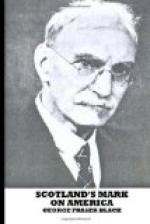Thomas Leiper (1745-1825), born in Strathaven, Lanarkshire, emigrated to Maryland in 1763, was one of the first to favor separation from the mother country, and raised a fund for open resistance to the Crown.
Robert Stuart (1785-1848), pioneer and fur-trader, born at Callander, Perthshire, a grandson of Rob Roy’s bitterest enemy. In 1810, in company with his uncle, John Jacob Astor, and several others, he founded the fur-trading colony of Astoria. His share in this undertaking is fully described in Washington Irving’s Astoria. In 1817 Stuart settled at Mackinac as agent of the American Fur Company, and also served as Commissioner for the Indian tribes. General George Bartram, of Scottish parentage, was one of the “Committee of Correspondence” appointed to take action on the “Chesapeake Affair” in 1807, when war with Britain seemed imminent, and was active in military affairs during the war of 1812. Allan Pinkerton (1819-84), born in the Gorbals, Glasgow, organized the United States Secret Service Division of the United States Army in 1861, discovered the plot to assassinate President Lincoln on his way to his inauguration in 1861, and also broke up the “Molly Maguires,” etc. William Walker (1824-60), the filibuster, was born in Tennessee of Scots parentage.
Rev. George Keith, a native of Aberdeen, became Surveyor-General of New Jersey in 1684. He founded the town of Freehold and marked out the dividing line between East and West Jersey. In 1693 he issued the first printed protest against human slavery, “An Exhortation & Caution to Friends concerning Buying and Keeping of Negroes,” New York, 1693. James Alexander (1690-1756), a Scot, was disbarred for attempting the defense of John Peter Zenger, the printer, in 1735. Along with Benjamin Franklin he was one of the founders of the American Philosophical Society. Andrew Hamilton (1676-1741), the most eminent lawyer of his time, Attorney-General of Pennsylvania, and chief Commissioner for building Independence Hall in Philadelphia, was born in Scotland. For his championship of the freedom of the press and his successful defense of Zenger he was hailed by Governor Morris as “the day-star of the Revolution.” His son James Hamilton, was the first native-born Governor of Pennsylvania and Mayor of Philadelphia. James Breghin or Brechin, Missionary, born in Scotland, took a prominent part in the affairs of Virginia (1705-19) and was an active supporter of Commissary Blair. Charles Anderson, another Missionary, probably a graduate of Aberdeen, served in Virginia from 1700 to 1719, was also a supporter of Blair. James Graham, first Recorder of the city of New York (1683-1700) and Speaker of Assembly (1691-99) was born in Scotland. Thomas Gordon (d. Perth Amboy, 1722), born in Pitlochrie, was Attorney-General of the Eastern District (1698), Chief Secretary and Registrar in 1702, later Speaker of Assembly, and in 1709 Chief Justice and Receiver-General




